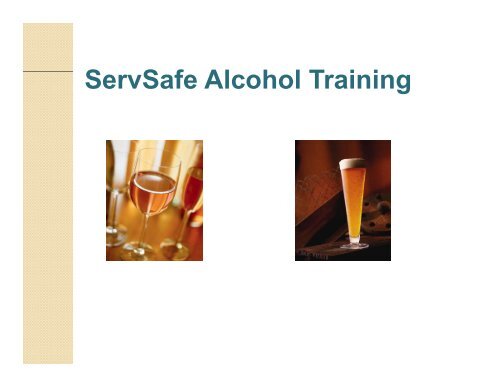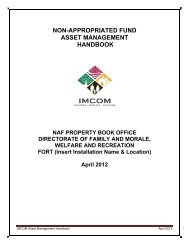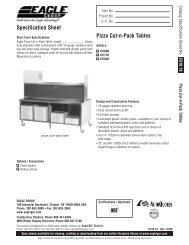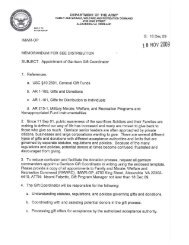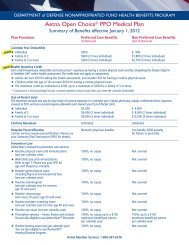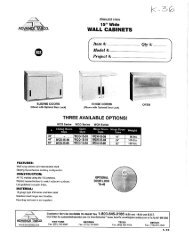ServSafe Alcohol Training - ArmyMWR.org
ServSafe Alcohol Training - ArmyMWR.org
ServSafe Alcohol Training - ArmyMWR.org
You also want an ePaper? Increase the reach of your titles
YUMPU automatically turns print PDFs into web optimized ePapers that Google loves.
S<strong>ServSafe</strong> S f Al <strong>Alcohol</strong> h l <strong>Training</strong><br />
T i i
Table of Contents<br />
1. <strong>Alcohol</strong> Law and Your Responsibility p y<br />
22. Recognizing and Preventing Intoxication<br />
33. Ch Checking ki Identification<br />
Id ifi i<br />
4. Handling Difficult Situations
WHO HAS TO TAKE “ <strong>Alcohol</strong> Service <strong>Training</strong>”<br />
g<br />
Licensees with on-premises privileges<br />
Restaurants, bars, nightclubs, taverns, pizza parlors,<br />
delis, brew pubs, hotels, private clubs, wineries<br />
Employees who mix, sell, or serve<br />
alcohol l h l in i any manner for f drinking d i ki on<br />
the premises and anyone who manages<br />
them<br />
Bartenders, servers, managers, hosts
Overview<br />
The sales and handling of alcoholic beverages result in<br />
serious responsibilities under state and local laws.<br />
All employees are required to strictly abide by these laws<br />
and the <strong>Alcohol</strong> Service and Beverage Policy to ensure that our<br />
facilities maximizes its efforts to protect guests from alcohol<br />
abuse.<br />
“<strong>ServSafe</strong> <strong>Alcohol</strong> Service <strong>Training</strong>” will build your skills to<br />
serve alcohol responsibly in any setting.<br />
Results: Improved Customer Relations.<br />
- Protect your customers<br />
RReduced d d Li Liquor Li Liability bilit EExposure.<br />
- Protect the Public and you<br />
Enhanced business.<br />
- Protect your business
Goals<br />
<strong>ServSafe</strong> <strong>Alcohol</strong> Service training will equip you to:<br />
• Identify <strong>Alcohol</strong> Law and your responsibility.<br />
• Recognize signs of intoxication.<br />
• Intervene where customers are intoxicated.<br />
• Prevent alcohol sales to minors.<br />
• Prevent alcohol-related incidents.<br />
• EEnsure all ll guests t hhave a pleasant l t experience!<br />
i !
Advantages of <strong>ServSafe</strong> <strong>Alcohol</strong> Service <strong>Training</strong><br />
• Satisfy more customers.<br />
• Enable Servers to better serve all customers.<br />
• IIncrease professionalism f i li of f staff. t ff<br />
• Reduce business expenses and liability<br />
exposure.<br />
• Enhance your business.
QUESTION:<br />
What Should You Do?<br />
Two restaurant servers have been serving a larger party all evening and are expecting to be<br />
tipped very well. At the end of the evening two of the guests who have had too much to<br />
drink ask for one last drink.<br />
What should the servers do in this situation?<br />
ANSWERS:<br />
A. They should serve the guests the two drinks; otherwise they<br />
probably will not get a good tip.<br />
B. They should make sure one server orders the drinks and the<br />
other server delivers the drinks.<br />
C C. They should serve the drinks in opaque cups cups, such as coffee<br />
cups, so no one knows they are consuming another alcoholic beverage.<br />
D. They should discuss their concerns regarding over serving these guests with their manager, and not<br />
serve the guests.
Facts regarding alcoholic related crashes<br />
The National Center for Injury Prevention and control has published the following facts<br />
with respect to alcohol related crashes.<br />
In 2009, almost 11,000 people were killed in crashes involving impaired drivers— nearly<br />
one‐third of all traffic deaths.<br />
In 2009, an average of 29 people died in alcohol‐impaired driving crashes every day.<br />
In 2009, an estimated 1.4 million arrests were made for driving under the influence.<br />
This is less than one percent of the 147 million self self‐reported reported episodes of alcohol alcohol‐<br />
impaired driving among U.S. adults each year.<br />
<strong>Alcohol</strong>‐related motor vehicle crashes kill someone every 30 minutes and non‐fatally<br />
injure someone every two minutes (NHTSA 2003a).<br />
During 2002, 17,419 people in the U.S. died in alcohol‐related motor vehicle crashes,<br />
representing 41% of all traffic‐related deaths (NHTSA 2003a).<br />
Drugs other than alcohol (e.g., marijuana and cocaine) have been identified as factors in<br />
18% of motor vehicle driver deaths. deaths Other drugs are generally used in combination<br />
with alcohol (NHTSA 1993).<br />
Nearly two‐thirds of children under 15 who died in alcohol‐related crashes between<br />
1985 and 1996 were riding with the drinking driver. More than two‐thirds of the<br />
di drinking ki drivers di were old ld enough h to bbe the h parent of f the h child hild who h was killed, kill d and d<br />
fewer than 20% of the children killed were properly restrained at the time of the crash<br />
(Quinlan 2000).
<strong>Alcohol</strong> Law and Your Responsibility<br />
LEGAL LIABILITIES as a seller or server of alcohol are:<br />
Criminal Liability<br />
Most states may y hold yyou criminally y liable if yyou:<br />
Serve alcohol to minor<br />
Serve a guest who is or appears to be intoxicated<br />
Possess, sell, or allow the sale of drugs on the premise<br />
Civil Liability<br />
Liable for selling alcohol to an intoxicated person when damages or injuries were caused by<br />
that person.<br />
Can be sued<br />
Forced to pay damages to an injured guest<br />
Dram Shop Laws<br />
Allow a third party to sue for injuries caused by a guest who was drinking there.<br />
Liquor Authority<br />
State or municipal agency that enforces alcohol regulations and licensing laws<br />
Municipality<br />
* Every employee who sells alcohol or tobacco products must be<br />
trained prior to serving.
<strong>Alcohol</strong> Law and Your Responsibility p y<br />
Statistics Show the most common violations and complaints involve:<br />
SSales l of f liquor li to t apparently tl intoxicated i t i t d persons<br />
Sales of liquor to persons under 21 years of age<br />
Dram shop laws make it possible for bar owners and alcohol<br />
servers to be held financially liable if a customer becomes obviously<br />
intoxicated on their premises and subsequently injures someone or<br />
causes property damage, typically by driving drunk.<br />
So, if a person has several alcoholic drinks at a restaurant or bar and<br />
is visibly intoxicated, and then gets in a car and kills someone on the<br />
way home, the owner of the serving establishment can be sued for<br />
damages
Liquor q Authority y<br />
Each state has its own liquor laws. To complicate matters, many<br />
municipalities have their own, often stricter, laws. Each state and<br />
many municipalities i i liti hhave a li liquor authority. th it Th These are often ft called ll d th the<br />
<strong>Alcohol</strong>ic Beverage Control or Liquor Control Commission. These<br />
agencies are responsible for:<br />
Enforcing alcohol laws<br />
Issuing and monitoring liquor licenses<br />
Issuing citations for violations<br />
Holding g hearings g for violations of the liquor q<br />
code
Liquor q Authority y -continued-<br />
The liquor authority can issue citations for :<br />
Selling liquor to a minor<br />
Failing to check the ID of a guest who appears to be underage<br />
Allowing a minor to enter the establishment with a fake ID<br />
Serving a guest who is or appears to be intoxicated.<br />
Discriminating against guests due to race, gender, age, or sexual orientation<br />
Selling or serving alcohol when it is not permitted.<br />
A liquor authority violation can result in the suspension or revocation of<br />
the establishment’s license.
Laws Restricting g <strong>Alcohol</strong> Service<br />
1. The legal age to drink. - In all 50 states, a person must be 21-years-old to<br />
purchase alcohol. In some states, it is legal for a parent or legal guardian to<br />
purchase h alcohol l h l and d serve it tto a minor i child. hild<br />
2. The legal age to serve. - In general, you must be 21-years-old to serve<br />
alcohol. Some states allow underage servers to:<br />
Bi Bring alcohol l h ltto th the ttable bl bbut tnot ttto pour it it.<br />
Take the order and payment for the drink, but not to serve the order<br />
Serve alcohol if they have applied for permission from the liquor<br />
authority.<br />
3. The legal age to enter the establishment.<br />
4. Serving intoxicated guests. – It is illegal to serve a guest who is intoxicated<br />
or who shows signs of intoxication.<br />
intoxication<br />
5. Serving a pregnant guest. – It is illegal to deny alcohol service to a women<br />
because she is pregnant. This would be considered gender discrimination.<br />
Many states require establishments to post signs warning about the effects<br />
of alcohol on a fetus.
Laws Restricting g <strong>Alcohol</strong> Service – continued-<br />
6. Hours of service. - The legal hours for the sale and service of alcohol are<br />
listed on the establishment’s liquor q license.<br />
7. Happy hours and other drink promotions. - Some states, counties, and<br />
municipalities restrict or forbid “happy hours” and other drink promotions.<br />
.<br />
These laws may prohibit serving a guest:<br />
Two or more drinks at a time<br />
An unlimited number of drinks for a fixed price<br />
Reduced-priced drinks for a specified period of time<br />
Drinks containing additional alcohol without an increase in price<br />
Drinks as a prize for a game or a contest conducted at the<br />
establishment
Recognizing and Preventing Intoxication<br />
Al <strong>Alcohol</strong> h l passes ffrom th the mouth th ddown th the esophagus h and d iinto t th the<br />
stomach and on into the small intestine. At each point along the way<br />
ethyl alcohol can be absorbed into the blood stream. However, the<br />
majority j y of the alcohol is absorbed from the stomach ( (approx. pp 20%) ) and<br />
the small intestine (approx. 80%),<br />
In general drinking more alcohol within a certain period of time will<br />
result in increased blood alcohol concentrations due to more alcohol<br />
being available to be absorbed into the blood.<br />
Blood <strong>Alcohol</strong> Content (BAC)<br />
Blood <strong>Alcohol</strong> Content is the legal measurement of the amount<br />
of alcohol in a person’s blood. It is stated as a percentage.<br />
A BAC of .10 means there is about one drop of alcohol for every 1,000 drops of<br />
blood in the bloodstream.<br />
Driving with a BAC of .08 or higher is against the law in all 50 states.<br />
A BAC of .30 or higher can lead to coma or death.
Recognizing and Preventing Intoxication<br />
Blood <strong>Alcohol</strong> Content (BAC) – continued-<br />
A 150-pound male drinking for one hour on an empty stomach would likely have the following<br />
BAC levels:<br />
2 drinks .05 BAC<br />
4 drinks .10 BAC<br />
8 drinks .20 20 BAC<br />
12 drinks .30 BAC<br />
Most states have set a legal limit for driving while intoxicated at .08 BAC. Some states also<br />
have penalties for driving under the influence at lower BAC levels. As a seller, you are not<br />
expected t d to t know k a customer's t ' BAC level. l l BBut t you do d need d a general l understanding d t di of f BAC BAC.<br />
Here are some key points to remember.<br />
• A customer’s BAC level can be different each time he or she drinks.<br />
• Intoxication rate factors affect how quickly the BAC level rises.<br />
• The higher the BAC level, the more behavioral cues your are likely to see.<br />
• Tolerance has no impact on a patron’s BAC level.<br />
• Time is the only thing that can lower a customer’s BAC level.
Factors That Affect a Guest’s BAC<br />
These factors help you assess how quickly someone is<br />
becoming intoxicated, giving you an idea of how rapidly that<br />
person’s p Blood <strong>Alcohol</strong> Content is rising. g<br />
Drinking Rate and The more alcohol a person consumes the<br />
amount consumed higher g the BAC level will be. The liver only y can remove<br />
alcohol from the body at the rate of one drink per hour.<br />
Drink Strength The more alcohol a drink contains, the more that will end<br />
up iin th the bl bloodstream. d t<br />
Body Size Smaller people are sometimes affected more<br />
quickly by alcohol than larger people.<br />
Body Fat A person with a large percentage of body fat will have a<br />
higher BAC than a lean person, all other factors being the<br />
same.<br />
Body fat doesn’t absorb alcohol.<br />
<strong>Alcohol</strong> can pass through muscle in a lean person and<br />
spread throughout the body.
Factors That Affect a Guest’s BAC - continued-<br />
Gender Typically, women are smaller than men, have<br />
more body fat and tend to reach higher BACs<br />
more quickly q y than men.<br />
Age A senior citizen will have a higher BAC than a younger guest.<br />
Body fat typically increase with age.<br />
Enzyme action tends to slow as a person gets older.<br />
Emotional state Wh When a person is i stressed, t d angry, or afraid, f id the th bbody d<br />
diverts blood to the muscles and away from the stomach<br />
and small intestine.<br />
This reduced blood flow slows the absorption of alcohol<br />
into the bloodstream.<br />
Medications Legal or illegal drugs can speed up the effects<br />
of alcohol and have an unpredictable effect.<br />
Food A full stomach before or during drinking slows<br />
the absorption of alcohol into the bloodstream.<br />
Carbonation Carbonation may speed the rate at which alcohol passes<br />
through the stomach. This causes a person to reach a<br />
higher BAC at a faster rate.
Assessing a Guest’s Level of Intoxication<br />
To prevent over service, you must be able to assess a guest’s level of<br />
intoxication.<br />
1. Count the number of drinks you serve.<br />
Proof is measure of a liquor’s strength. By dividing the proof by two, you can determine how<br />
much alcohol a liquor contains. For example,<br />
100-proof whiskey = 50% alcohol<br />
80-proof vodka = 40% alcohol<br />
1 Drink =<br />
5 ounce of Wine<br />
(Domestic ( wine at 12% alcohol) )<br />
12 ounce of Beer<br />
(American lager at 4-5% alcohol)<br />
1½ ounces of 80-proof liquor<br />
1 ounce of 100-proof liquor
Assessing a Guest’s Level of Intoxication -continued continued-<br />
22. Observe Behavior<br />
Observing Guests for Signs of Intoxication<br />
Ph Physical i l and d BBehavioral h i l Si Signs of f IIntoxication t i ti<br />
• Relaxed Inhibitions – persons with lowered inhibitions can become talkative, talk<br />
loudly, become overfriendly, relaxed, or argumentative.<br />
• Impaired Judgment – persons showing impaired judgment may complain about<br />
the strength of a drink, begin drinking faster, make irrational or argumentative statement, or<br />
become careless with money.<br />
• Slowed Reactions – persons with slowed reactions may talk or move slowly slowly, have<br />
glassy or unfocused eyes, f<strong>org</strong>et things, or lose their train of thought.<br />
• Impaired motor coordination – stagger, stumble, fall down, bump objects, or<br />
sway when sitting or standing.<br />
Be unable to pick up objects or may drop them.<br />
Spill drinks or miss their mouths when drinking.<br />
Slur their speech<br />
Having g difficulty y lighting g g a cigarette. g
Assessing a Guest’s Level of Intoxication -continued continued-<br />
3. Tolerance to <strong>Alcohol</strong><br />
1. People can build up a tolerance to alcohol. Tolerance is the ability to handle the<br />
effects of alcohol without showing g the usual signs. g An experienced p drinker can<br />
often consume a lot of alcohol without showing any signs These people have<br />
learned to hide them – even after becoming intoxicated.<br />
2. Tolerance does not affect a guest’s g BAC, , jjust his or her ability y to hide the<br />
effects of alcohol.<br />
3. Most establishments have guests who are regular patrons. You can become<br />
used to their drinking g habits and ability y to handle liquor. q But these ppeople p may y<br />
be leaving your establishment with a dangerously high BAC. Always count<br />
drinks.<br />
4. Inexperienced Drinkers - They often show signs of intoxication after drinking<br />
p y g g<br />
only a small amount of alcohol. Their bodies are not used to alcohol and are<br />
sensitive to smaller amounts.
Assessing a Guest’s Level of Intoxication -continued continued-<br />
The Importance of Observation and Communication<br />
Monitor guests g from the moment they y arrive until they y are ready y to leave:<br />
• Observe how people act.<br />
• Hear what customers say.<br />
• Judge the needs of customers.<br />
• Respond appropriately.
Preventing Guests from Becoming Intoxicated<br />
As a seller or server of alcohol, you must do everything possible to ensure that<br />
guests do not become intoxicated. This can sometimes be a difficult task, but<br />
you can do some simple things. These practices will help guests drink<br />
responsibly.<br />
1. Offer food: This is one of the most important things you can do to help prevent<br />
intoxication.<br />
Offer food high in fat and/or protein (e.g., pizza, chicken wings, cheese,<br />
deep-fried items).<br />
Avoid food that is high in sugar or carbohydrates (e.g., bread). – easily<br />
digested.<br />
Avoid food items that are salty (e.g., peanuts, pretzels, chips). – make a<br />
guest more thirsty and cause them to drink more alcohol.<br />
2. Offer water: Drinking alcohol causes dehydration, making guests thirsty.<br />
3. Avoid over pouring when mixing drinks.<br />
4. Avoid serving the guest more than on drink at a time.
Checking Identification<br />
Acceptable Forms of Identificaiton<br />
All identification must be official documents issued and sealed by a<br />
government entity and contain a clear photo photo, description and date<br />
of birth.<br />
Driver’s License<br />
State ID Card<br />
Passport<br />
Military ID<br />
Verification of Identification<br />
When checking an ID, you must verify that it:<br />
is valid. - It contains the owner’s birth date.<br />
It is current. current<br />
It contains the owner’s signature.<br />
It contains the owner’s photo.<br />
It is intact.<br />
is genuine.<br />
has not been issued to a minor.<br />
belongs to the guest.
Checking Identification -continued-<br />
Verification Guidelines<br />
Some guidelines to verify the authenticity of a driver’s license or ID<br />
include:<br />
• The card expiration date – do not accept the license if it has<br />
expired;<br />
• Glue lines or uneven surfaces by the picture or date of birth –<br />
often indicate tampering;<br />
• Consistency of numbers – the typeset for the birth date and<br />
expiration date should match lettering used on the rest of the<br />
license;<br />
• The state logo g – a partially p y missing g state logo g is a sign g of a<br />
fake card;<br />
• Pin holes on the surface – bleach may have been inserted to<br />
“white out” certain aspects of a date; and<br />
• The card’s reverse side lettering is blurred – counterfeiters<br />
often photocopy the reverse side of a license.
Verification Guidelines -continued- ti d<br />
• Someone else’s card – make sure the photo, height and<br />
weight match the person requesting service.<br />
If there is an issue with regard to verification, ask for a second<br />
piece of identification, question the cardholder about basic<br />
information on the card such as middle initial initial, full address with zip<br />
code, birth date, etc. or request assistance from the manager or<br />
supervisor on duty.<br />
Where there is any question as to the identity verification, service<br />
must be refused.
The Proper Procedure For Checking IDs<br />
1. Greet the guest. - The greeting can tell you if the guest is nervous. This<br />
may indicate he or she is minor.<br />
2. Politely as the guest for ID. - Ask the guest to remove the ID from his or<br />
her wallet. Be sure you look at both sides of the ID.<br />
33. VVerify if the th ID – ID checking h ki guides, id ID readers, d UV li lights, ht and d magnifying if i<br />
devices may make it easier to verify IDs.<br />
4. Seek further verification if necessary. - You can take several steps if you<br />
are still till not t sure about b t th the ID ID.<br />
Ask the guest for a second valid ID.<br />
Compare the guest’s signature to the ID signature.<br />
AAsk k th the guest t questions: ti<br />
What is your address?<br />
How tall are you?<br />
What is your middle name?
RRefusing f i SService i To T A AMi Minor<br />
When you refuse service to a minor, be firm,<br />
but always express regret regret. Do not sound authoritative or<br />
judgmental. You should also avoid embarrassing the<br />
person.<br />
Give reason for your actions:<br />
“I’m sorry, y, but it’s illegal g to serve a minor.”<br />
“I’m sorry, but I can’t serve you without a valid ID.”<br />
“I’m sorry, but our company policy will not allow me to serve<br />
you.”
Handling Difficult Situations<br />
Handling Intoxicated Guests<br />
Stopping Service to Intoxicated Guests.<br />
If they show physical or behavioral signs of intoxication.<br />
If you are concerned about the number of drinks they have<br />
had had.<br />
When stopping service to a guest:<br />
1. Alert a backup. - The backup person must be:<br />
PPrepared d to hhelp. l<br />
Close enough to observe.<br />
Not too close so as to appear threatening.<br />
2. Enlist the help of other guests (if possible).<br />
Wait until the intoxicated guest steps away.<br />
Ask the guest’s companion to help stop<br />
service.<br />
i
Handling Difficult Situations<br />
Handling Intoxicated Guests - continued -<br />
3. Wait until the guest orders the next round before stopping<br />
service. - If you notice that a guest is becoming intoxicated<br />
you must stop service immediately.<br />
4. Tell the guest you are stopping service. – Always keep the<br />
conversation private. To prevent a confrontation:<br />
1. Don’t be judgmental. – Never use “You” statement.<br />
SSay things thi like: lik<br />
“Our company policy doesn’t allow me to serve you<br />
any more alcohol.”<br />
“I’m not able to serve you y any y more alcohol this<br />
evening.”<br />
“We would be responsible if something were to<br />
happen.”<br />
“It It is against the law for me to serve you any more<br />
alcohol.”
Handling Difficult Situations<br />
Handling Intoxicated Guests - continued -<br />
1. Express concern and be genuine. – Tell the guest that you<br />
are concerned about his or her safety.<br />
Say things like:<br />
“I just want to make sure you get home OK.”<br />
“We We want you to come back again.” again.<br />
“Why don’t we call it a night? We’ll see you<br />
tomorrow.”<br />
22. EExpress empathy. th - Sh Show th the guest t you understand d t d hhow hhe<br />
or<br />
she is feeling. Make sure that you maintain eye contact while<br />
you talk to the guest, and nod and shake your head when<br />
appropriate. pp p<br />
Say things like:<br />
“ I know this is frustrating or annoying, but I am<br />
concerned about your safety.”<br />
“II know you’re you re upset upset. I would be upset too too, but we<br />
just want to make sure that nothing happens to you.”
Handling Difficult Situations<br />
Handling Intoxicated Guests - continued -<br />
3. Be firm. - Guests will often try to persuade you to change your<br />
mind or ask for “just one more” drink. Once you have made<br />
the decision to stop service, stick to it. Be patient and remain<br />
calm. Simply and clearly repeat your decision to stop alcohol<br />
service as often as necessary.<br />
5. Offer nonalcoholic alternatives. - Offer the guest coffee,<br />
soft drinks, or other nonalcoholic alternatives.<br />
Once alcohol service to a guest has been stopped, it is the server’s<br />
Responsibility to ensure that the guest does not receive a drink from<br />
friends or get a drink from another server or bartender.<br />
Occasionally, you may need to stop service to a “regular.”<br />
This can sometimes be awkward, especially when the guest has been coming<br />
To the establishment for a long time time. When guests have had enough enough, they<br />
Have had enough, regardless of their patronage.
Handling Difficult Situations<br />
Handling Intoxicated Guests Attempting to Leave the Premises<br />
1. Try to convince the guest not to drive.<br />
Avoid being judgmental judgmental.<br />
Express concern.<br />
2. Ask for the guest’s keys.<br />
Warn the guest that you will call the police.<br />
Call the police if the guest g insists on driving. g Provide the police with the make,<br />
model, license plate number, and direction in which the guest was driving.<br />
You can only ask a guest for his or her car keys. You cannot demand or take<br />
them.<br />
3. Arrange alternate transportation.<br />
Asking a sober companion to drive drive.<br />
Calling the guest’s friend or relative.<br />
Calling a cab.<br />
You should never “throw out” intoxicated guests, even if they are disturbing other<br />
guests or causing a scene. If you must ask guests to leave, arrange<br />
transportation for them.<br />
You should say something like:<br />
“I’m sorry, but I’m not able to serve you any more alcohol this evening. I’d like to<br />
call someone to come and pick you up. If you decide to drive, I’ll Ill have no<br />
choice but to call the police. What would you like me to do?”
Handling Difficult Situations<br />
Dealing with Guests Who Arrive Intoxicated<br />
Sometimes, a guest might arrive at your establishment intoxicated. You always have<br />
1.<br />
the right to refuse service, but you should make sure the person gets home safely.<br />
Try y to refuse entry. y<br />
2. Make sure the guests are not served alcohol if they enter the establishment.<br />
Communicate with all appropriate coworkers about the guest’s condition.<br />
3. Ask the guests for their keys.<br />
If they refuse, tell them that you will call the police if they attempt to drive.<br />
If they insist on driving driving, call the police police.<br />
4. If the guests have agreed not to drive, find alternate transportation.<br />
Designated Drivers.<br />
One person in a group of drinkers agrees to be the designated driver. The designated<br />
drive agrees not to drink alcohol during his or her visit. The establishment usually<br />
offers the person free food or nonalcoholic beverages. Sometimes the designated<br />
drier receives coupons for future visits.<br />
You are still liable for overserving guests even if they have a designated driver.<br />
Encourage the person not to drink alcohol.<br />
If the person starts drinking drinking, watch him or her like you would any other guest guest.<br />
If the person does not drink, follow your company policy regarding the service of free<br />
items.
Handling Difficult Situations<br />
Handling Potentially Violent Situations<br />
You may face situations that could become violent. If you faced these situations you<br />
must:<br />
Make a reasonable effort to anticipate p pproblems.<br />
Prevent injuries.<br />
1. Notify your manager.<br />
Pay close attention to guests .<br />
Involve your manager early to determine the best way to handle the situation situation.<br />
2. Call the Police.<br />
Do not assume that the situation will resolve itself. It usually won’t. .<br />
3. Separate guests from the situations.<br />
Never touch or try to physically restrain a violent guest.<br />
Handling Illegal Activities .<br />
It is against the law to allow certain activities to continue on the premises. That<br />
includes gambling, prostitution, and the possession or sale of drugs.<br />
Consider your safety and the safety of your guests before taking action.<br />
Notify your manager.<br />
Call the police.<br />
police
Handling Difficult Situations<br />
Management Support<br />
You should always involve a manager when handling the<br />
situations such as stopping service to a guest.<br />
If you are not comfortable with what your manager has asked you to<br />
do do, you should:<br />
Express your concern.<br />
Ask the manager to do it instead.<br />
Talk to the owner or your human resources department department. - This is<br />
especially important if you feel that you are being asked to do<br />
something that is against the law, such as continuing to serve<br />
visibly intoxicated guests.
Document Incidents.<br />
Handling Difficult Situations<br />
When an incident occurs on the premises, your establishment may require<br />
you to complete an incident report report. An incident report is used to document<br />
what happened during the incident and what actions were taken. These<br />
reports help your <strong>org</strong>anization determine if policies are effective or whether<br />
they need to be revised.<br />
Provide accurate information.<br />
Fill out the report immediately so important facts are not f<strong>org</strong>otten.<br />
Follow your company policy on what t include and how to document the incident.<br />
IIncident id reports should h ld bbe completed l d when: h<br />
<strong>Alcohol</strong> service has been stopped to a guest.<br />
Alternate transportation has been arranged for a guest.<br />
A guest’s ID has been confiscated.<br />
An illegal activity or violent situation has occurred.<br />
A guest has become ill.
Results of <strong>Training</strong><br />
• Satisfied ccustomers. stomers<br />
• Responsible beverage service.<br />
• Relaxed and comfortable atmosphere for customers.<br />
• Control within social drinking environment.<br />
• Encouragement of responsible drinking.<br />
• Ability to intervene and resolve customer issues issues.<br />
• Exhibit positive responsible alcohol service.<br />
• Increased knowledge and intervention skills.
<strong>Alcohol</strong> Awareness<br />
<strong>Alcohol</strong> Awareness is a growing concern within the Hospitality Industry<br />
nationwide. By recognizing the “early” signs of intoxication, monitoring<br />
your customer’s consumption, and treating them as you would a guest<br />
i in your own home; h you fulfill f lfill your responsibility ibilit and d protect t t the th guest. t<br />
By understanding and fulfilling your responsibilities …<br />
Your Role as a bartender or server:<br />
Observe<br />
Monitor<br />
Report<br />
Assisted by the guidance and support of management …<br />
Your Role as a Manager:<br />
Confirm<br />
Confront<br />
Resolve
CONGRATULATIONS!


